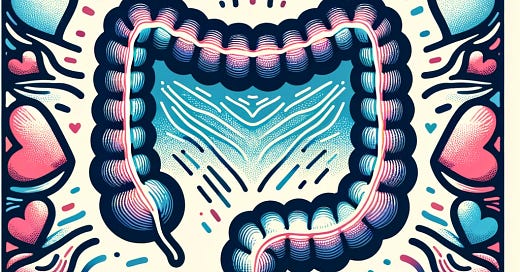Women of Generation X, Y, Z - get your colorectal screening on your self-care "checklist"!
Colorectal Health is a Women's Health Topic That Needs Attention Now
TL; DR: Ladies, listen: Demand a colorectal risk assessment for your most accurate screening age! Demand a colonoscopy ESPECIALLY IF YOU ARE YOUNG and having symptoms! Colorectal cancer is the 2nd leading cause of death in WOMEN UNDER AGE 50 YEARS.
March is spring, March is flowers, March is my birthday, 365 days shy of age 45 years. But amidst the arrival of springier days lies a critical reminder – it’s Colorectal Cancer Awareness Month. And this is especially pertinent to women turning age 45 or older, as colorectal cancer is ranked the second leading cause of cancer death in women under age 50 years.
In the calmness of March, I often reflect on the courage of a particular lady patient I encountered during the scary stillness of the March 2020 COVID-19 shutdown. Those days, filled with trepidation, doctors doing thorough interviews or physical examinations were curtailed, if done at all. We lived in suits called personal protective equipment to protect ourselves from one another, from the unknown, from fear of death. Critical procedures for colorectal cancer detection, like colonoscopies, were halted, save for emergency cases presenting with alarm symptoms like bleeding, unexplained weight loss, or anemia—ominous signs of potentially dire conditions such as colorectal cancer.
This lovely GenXer arrived at her appointment with fear and frustration. She had been waiting months to see a female doctor for her colonoscopy and this procedure was delayed further due to the pandemic shut down. She told me she had a previous normal screening colonoscopy three years ago by another physician. Also akin to many women during the pandemic she had avoided medical care in general.
Without the possibility of a proper interview or physical exam, her concerns had not been addressed. This was my first meeting with her. Through palpation, I discerned a fullness in her right lower quadrant, likely a mass, which revealed itself to be right-sided colon cancer during the colonoscopy. It was an “interval” advanced colorectal cancer. She joined the other members of her birth cohort (Gen X, Y and Z) with rising rates of early onset colon cancer at advanced stages. She decided not pursue treatment and died a year later.
Ask about a colorectal cancer screening risk assessment - It’s a vital act of self-care!
The memory of this patient with interval colorectal cancer returns to me each March, not solely because it's the time to spotlight colon cancer but because it’s a reminder that colorectal cancer can be insidious, lurking undetected even after a negative colonoscopy. This patient, three years prior to that day in March of 2020 had been given a clean bill of health. Yet, an interval colon cancer, which is defined as a cancer within 60 days following a negative screening colonoscopy, had stealthily developed. Ladies, listen. Development of an interval cancer is associated with the female sex. While the reasons for this is still being researched, it is important to stress that in addition to interval cancers being associated with the female sex, interval cancers are also associated with right side (proximal) colon location. And it is us ladies compared to men who are at increased risk for both right sided colon cancers and having incomplete colonoscopies (aka doctor does not examine the right side of the colon).
Fortunately, this March, we can once again sit face-to-face in conversation, and ask about a colorectal cancer screening risk assessment. Do you need a colonoscopy sooner than age 45 years based on history? This can sometimes be more complex and while taking a quiz to understand your risk is very helpful to start the conversation, the nuances and complexities of history are important to review with your gastroenterologist. Your personal or family history, including type, size, number of polyps isn’t generally captured in these risk assessment quizzes or by any medical intake form. This area is evolving as we speculate on the diet, life exposures and microbiome mechanisms that increase the risk of colorectal cancer in Gen X, Y and Z. Prioritize your health, discuss colorectal screening with your gastroenterology doctor, and ensure it's on your to-do list. For mothers, daughters, and sisters—it's a vital act of self-care.
Birth Cohort Colorectal Cancer
Gupta S,etal. Birth Cohort Colorectal Cancer (CRC): Implications for Research and Practice. Clin Gastroenterol Hepatol. Mar 2024;22(3):455-469 e7.
Young Women: Demand a Colonoscopy!
This increasing incidence of early onset and advanced colorectal cancer in all genders and races of Generation X, Y, and Z is always on my mind when I am evaluating young folks with symptoms. Having gastrointestinal bleeding, weight loss, changes in bowel habits, or anemia warrant a colonoscopy investigation NOW!
There is story after story of young female patients living with symptoms thought to be irritable bowel syndrome and/or hemorrhoids and these assumptions lead to a delay in proper work-up. Later, after a colonoscopy these young folks are told they have early onset colorectal cancer. Demand a colonoscopy ESPECIALLY IF YOU ARE YOUNG and having symptoms!
Next time, we will continue to be serious about our colorectal health AND delve deeper into the unique experiences of women in healthcare and embrace the vital topic of rectal health. This underserved, yet vital body part resides in the pelvis, which we as women must own with confidence and care.
End dictation.
Your Lady MD,
Emily






Honestly, I was shocked at these stats. Thank you for writing this article, I feel way more informed about how I would go about advocating for myself if needed.